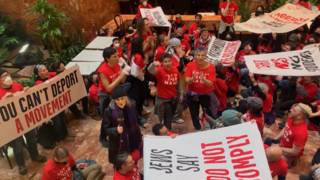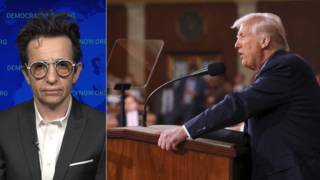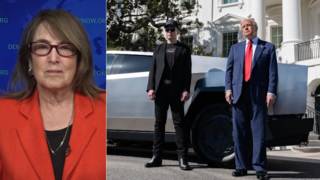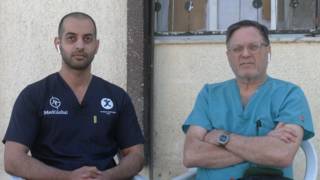HeadlinesMarch 21, 2000
Gunmen Line Up and Fatally Shoot 40 Sikh Villagers in Kashmir
Gunmen lined up and fatally shot 40 Sikh villagers in India’s disputed northern territory of Kashmir. The killings cast a pall over the start of President Clinton’s visit to the country. Monday night’s shootings were the first major attack on Sikhs in Kashmir. Until now, the minority religious group has been spared from an Islamic rebellion that began a decade ago in Kashmir, a Himalayan region divided between India and Pakistan along an uneasy ceasefire line. Concentrated in a handful of towns and villages, most Kashmiri Sikhs have remained neutral in the conflict, many of them running trucking companies that supply the remote region, the only Muslim-majority territory in otherwise Hindu-dominated India. Indian army officers had warned they expected a major operation by pro-separatist militants as a way to focus attention on the Kashmir dispute during Clinton’s visit.
Bertelsmann AG to Join Compensation Fund for Nazi-Era Slave Laborers
Thomas Middelhoff, chief executive of Bertelsmann AG said yesterday the German media giant will join a 10 billion mark, or $5 billion, compensation fund for Nazi-era slave laborers. The outline of the fund, which aims to compensate survivors of concentration camps and forced work schemes, was agreed late last year, but the German government and survivors groups are still in intense negotiations to decide the details. Middelhoff said there was no evidence to show the firm employed forced labor or slave laborers under Adolf Hitler, and the contribution was not an admission of guilt. Some 65 top German firms, including blue chips like Siemens, Volkswagen, DaimlerChrysler, launched the fund after legal threats and warnings they may face trade sanctions in the United States. Industry will pay five billion marks under the settlement, while Germany must pay the equal sum from the public purse for its contribution.
Clinton Eases Sanctions Imposed on India After 1998 Nuclear Tests
President Bill Clinton has eased sanctions imposed on India after its nuclear tests in 1998 to allow a $25 million U.S. program to strengthen Indian financial markets to resume, according to the White House. The move will allow the financial institution’s reform and expansion program funded by the U.S. Agency for International Development to resume, providing technical assistance to India’s regulatory agencies and financial markets. The sanctions have already been eased once in October to lift restrictions placed on certain environmental programs, and U.S. officials say they may be relaxed further during Clinton’s four-day, five-city Indian trip.
H. Rap Brown Arrested After Shootout with U.S. Marshals
H. Rap Brown, the former Black Panther leader, was arrested after a shootout with U.S. marshals in connection with last week’s fatal shooting of a deputy. Now known as Jamil Abdullah Al-Amin, he was arrested last night in Alabama’s Lowndes County, west of Montgomery. According to an FBI agent, authorities spotted him hiding in a shed, they said, three days after he allegedly killed one sheriff’s deputy and seriously wounded another, while they tried to serve him with an arrest warrant in Atlanta, 160 miles northeast of Montgomery, Alabama. The FBI agent said Al-Amin immediately began firing shots at the team of U.S. marshals who found him in the shed, then ran into nearby woods. Federal and state agents circled him, then released dogs into the area, according to the FBI. Within moments, Al-Amin was arrested uninjured. Several other people were being detained for possibly “harboring a fugitive,” though no charges have been filed, according to the Atlanta police chief. It was not immediately clear what led up to the confrontation in the shed.
Community Leaders Press for Federal Oversight of NYPD
Community leaders and politicians have stepped up demands for federal oversight of the New York Police Department in the wake of the police shooting of an unarmed African-American man. Yesterday, the Reverend Al Sharpton met with Brooklyn U.S. Attorney Loretta Lynch. Sharpton says he urged Lynch to impose a federal monitor in brutality cases. New York Congressmember Charles Rangel wrote to Attorney General Janet Reno about the same thing.
NYC Lawyer Says Giuliani Had a Right to Release Dorismond’s Criminal Record
New York City’s top lawyer says that Mayor Rudolph Giuliani had a right to release Patrick Dorismond’s criminal record, including a sealed juvenile offense. Patrick Dorismond was the 26-year-old security guard who was killed by undercover police on Thursday morning. Dorismond was fatally shot after he stepped out of a bar, was approached by police, and they asked him for drugs. Various activists are accusing Mayor Giuliani of breaking the law by releasing a sealed juvenile record of Dorismond, a record of activities that Dorismond was charged with when he was 13 years old.
Most popular
- 1
- 2
- 3
- 4
Non-commercial news needs your support
Please do your part today.











Media Options